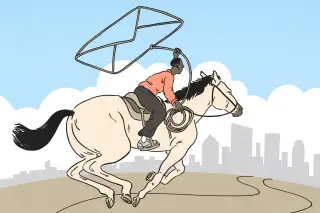The Job Market Is a Mess Because of the Coronavirus. Here’s What Recent Graduates Can Expect

It’s one of the worst times in history to look for a job, especially for recent college graduates.
Job listings for entry-level positions are down 73% since December in every major industry and metropolitan area, according to data provided by the jobs site ZipRecruiter.
Some of the biggest losses have been in industries where young people are typically in high demand — like software development, marketing, and customer service. Now recent graduates fear that the years of studying they put into degrees tailored to these career paths are about to be worth next to nothing.
Those fears are legitimate, experts say.
“The situation is showing us that even industries usually considered ‘recession-proof’ aren’t ‘pandemic-proof,’” says Julia Pollak, a labor economist at ZipRecruiter.
In the past decade, hiring has typically been driven by growth. Companies, especially start ups, want to grow their influence, so they hire a robust team to make their business as visible (and profitable) as possible. Now those same companies are cutting back drastically, and only keeping positions that are directly responsible for making them the most money, according to Pollak.
Businesses are still hiring, but mostly for more senior positions that have either been recently vacated or created to serve a Coronavirus-specific need — like brick and mortar businesses that have been hiring e-commerce staffers to help them build a stronger online presence.
“Business owners are looking for people who have a good grasp of online shopping platforms like Shopify and Amazon web services,” says Pollak.
Just because positions in a graduate’s area of expertise are far and few between doesn’t mean it’s impossible to find work. Listings for jobs in grocery stores, warehousing, and delivery services have increased, especially for large shopping platforms like Target and Amazon. There’s also an increased demand for people who can assist in pandemic relief efforts by sewing masks, doing contact tracing, and performing temperature screenings.
These roles might not be a young person’s dream job, but over the next several months, what was once thought of as “irrelevant” work experience will actually look pretty good on a resume.
“When employers hire someone, they want to see people who found ways to make themselves useful and gain skills despite all of the constraints,” says Pollak.
What about internships? Data from ZipRecruiter shows listings for those opportunities are down 69% from March, but for unpaid internships, that number is only down 35%. In March they accounted for only a 1.9% share of all internship jobs available, now that share is around 9.14%. While still lower than normal levels, the odds of scoring an unpaid position are certainly higher than the odds of getting paid.
In recent years, labor activists have fought to make unpaid internships illegal, pointing to research that shows how these opportunities overwhelmingly favor only the most privileged students (namely, wealthy white men). Still, they persist.
“We thought the wage pressure would cause them to decline, but they haven’t. They’re actually relatively stable,” says Pollak.
This influx of low or no-wage jobs is a pretty major indicator of perhaps the biggest struggle young graduates are expected to face: playing financial catch-up for years to come.
During the last recession, many young Americans’ entry into the workforce was delayed, as unemployment hovered around 10%. Even after gaining full-time employment, they saw lower wages than previous cohorts and many are still playing catch up to this day due to their late entry.
This time around, there probably won’t be as much stigma surrounding unemployment since many companies are laying off more than half of their workforce. But the job market will be fiercely competitive once it ramps back up. Job seekers with years of experience and expertise will be competing for the same roles as those who just received diplomas in the mail. And as companies embrace remote work instead of paying for office space, the competition pool opens up to the entire country — potentially driving down salaries in the process.
“There’s going to be more interest in affordable places to live and work,” says Pollak. “If you’re hiring people who live in Texas or Tennessee, it may push wages down for everyone.”
More from Money:
Earning a College Degree on Zoom May Not Be the Same. But There Are Unique Benefits, Experts Say
Where Home Prices Are Heading in the Age of Coronavirus
How to Tell if a Job Offer is Secure in an Unstable Labor Market